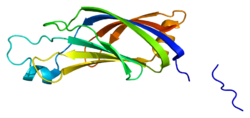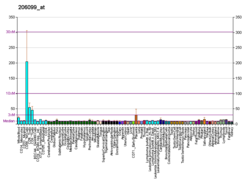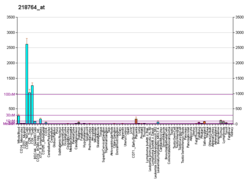PRKCH
PRKCH
Protein-coding gene in the species Homo sapiens
Protein kinase C eta type is an enzyme that in humans is encoded by the PRKCH gene.[5][6][7]
Protein kinase C (PKC) is a family of serine- and threonine-specific protein kinases that can be activated by calcium and the second messenger diacylglycerol. PKC family members phosphorylate a wide variety of protein targets and are known to be involved in diverse cellular signaling pathways. PKC family members also serve as major receptors for phorbol esters, a class of tumor promoters. Each member of the PKC family has a specific expression profile and is believed to play a distinct role in cells. The protein encoded by this gene is one of the PKC family members. It is a calcium-independent and phospholipids-dependent protein kinase. It is predominantly expressed in epithelial tissues and has been shown to reside specifically in the cell nucleus. This protein kinase can regulate keratinocyte differentiation by activating the MAP kinase MAPK13 (p38delta)-activated protein kinase cascade that targets CCAAT/enhancer-binding protein alpha (CEBPA). It is also found to mediate the transcription activation of the transglutaminase 1 (TGM1) gene.[7]
- "Human PubMed Reference:". National Center for Biotechnology Information, U.S. National Library of Medicine.
- "Mouse PubMed Reference:". National Center for Biotechnology Information, U.S. National Library of Medicine.
- Bacher N, Zisman Y, Berent E, Livneh E (Feb 1991). "Isolation and characterization of PKC-L, a new member of the protein kinase C-related gene family specifically expressed in lung, skin, and heart". Mol Cell Biol. 11 (1): 126–33. doi:10.1128/mcb.11.1.126-133.1991. PMC 359602. PMID 1986216.
- Bacher N, Zisman Y, Berent E, Livneh E (Apr 1992). "Isolation and characterization of PKC-L, a new member of the protein kinase C-related gene family specifically expressed in lung, skin, and heart". Mol Cell Biol. 12 (3): 1404. doi:10.1128/mcb.12.3.1404-.1992. PMC 369574. PMID 1545821.
- Greif H, Ben-Chaim J, Shimon T, et al. (1992). "The protein kinase C-related PKC-L(eta) gene product is localized in the cell nucleus". Mol. Cell. Biol. 12 (3): 1304–11. doi:10.1128/mcb.12.3.1304-1311.1992. PMC 369563. PMID 1545811.
- Liyanage M, Frith D, Livneh E, Stabel S (1992). "Protein kinase C group B members PKC-delta, -epsilon, -zeta and PKC-L(eta). Comparison of properties of recombinant proteins in vitro and in vivo". Biochem. J. 283 (3): 781–7. doi:10.1042/bj2830781. PMC 1130954. PMID 1590767.
- Ruegg CL, Strand M (1991). "A synthetic peptide with sequence identity to the transmembrane protein GP41 of HIV-1 inhibits distinct lymphocyte activation pathways dependent on protein kinase C and intracellular calcium influx". Cell. Immunol. 137 (1): 1–13. doi:10.1016/0008-8749(91)90051-C. PMID 1832084.
- Chowdhury IH, Koyanagi Y, Kobayashi S, et al. (1990). "The phorbol ester TPA strongly inhibits HIV-1-induced syncytia formation but enhances virus production: possible involvement of protein kinase C pathway". Virology. 176 (1): 126–32. doi:10.1016/0042-6822(90)90237-L. PMID 1970444.
- Ruegg CL, Strand M (1990). "Inhibition of protein kinase C and anti-CD3-induced Ca2+ influx in Jurkat T cells by a synthetic peptide with sequence identity to HIV-1 gp41". J. Immunol. 144 (10): 3928–35. doi:10.4049/jimmunol.144.10.3928. PMID 2139676.
- Jakobovits A, Rosenthal A, Capon DJ (1990). "Trans-activation of HIV-1 LTR-directed gene expression by tat requires protein kinase C." EMBO J. 9 (4): 1165–70. doi:10.1002/j.1460-2075.1990.tb08223.x. PMC 551792. PMID 2182321.
- Fields AP, Bednarik DP, Hess A, May WS (1988). "Human immunodeficiency virus induces phosphorylation of its cell surface receptor". Nature. 333 (6170): 278–80. Bibcode:1988Natur.333..278F. doi:10.1038/333278a0. PMID 3259291. S2CID 4254146.
- Chirmule N, Goonewardena H, Pahwa S, et al. (1995). "HIV-1 envelope glycoproteins induce activation of activated protein-1 in CD4+ T cells". J. Biol. Chem. 270 (33): 19364–9. doi:10.1074/jbc.270.33.19364. PMID 7642615.
- Ward NE, Gravitt KR, O'Brian CA (1995). "Inhibition of protein kinase C by a synthetic peptide corresponding to cytoplasmic domain residues 828-848 of the human immunodeficiency virus type 1 envelope glycoprotein". Cancer Lett. 88 (1): 37–40. doi:10.1016/0304-3835(94)03610-U. PMID 7850771.
- Palmer RH, Ridden J, Parker PJ (1995). "Identification of multiple, novel, protein kinase C-related gene products". FEBS Lett. 356 (1): 5–8. doi:10.1016/0014-5793(94)01202-4. PMID 7988719.
- Gupta S, Aggarwal S, Kim C, Gollapudi S (1994). "Human immunodeficiency virus-1 recombinant gp120 induces changes in protein kinase C isozymes--a preliminary report". Int. J. Immunopharmacol. 16 (3): 197–204. doi:10.1016/0192-0561(94)90013-2. PMID 8206685.
- Parada NA, Cruikshank WW, Danis HL, et al. (1996). "IL-16- and other CD4 ligand-induced migration is dependent upon protein kinase C." Cell. Immunol. 168 (1): 100–6. doi:10.1006/cimm.1996.0054. PMID 8599832.
- Denning MF, Dlugosz AA, Threadgill DW, et al. (1996). "Activation of the epidermal growth factor receptor signal transduction pathway stimulates tyrosine phosphorylation of protein kinase C delta". J. Biol. Chem. 271 (10): 5325–31. doi:10.1074/jbc.271.10.5325. PMID 8621384.
- Ueda E, Ohno S, Kuroki T, et al. (1996). "The eta isoform of protein kinase C mediates transcriptional activation of the human transglutaminase 1 gene". J. Biol. Chem. 271 (16): 9790–4. doi:10.1074/jbc.271.16.9790. PMID 8621660.
- Conant K, Ma M, Nath A, Major EO (1996). "Extracellular human immunodeficiency virus type 1 Tat protein is associated with an increase in both NF-kappa B binding and protein kinase C activity in primary human astrocytes". J. Virol. 70 (3): 1384–9. doi:10.1128/JVI.70.3.1384-1389.1996. PMC 189957. PMID 8627654.
- Holmes AM (1996). "In vitro phosphorylation of human immunodeficiency virus type 1 Tat protein by protein kinase C: evidence for the phosphorylation of amino acid residue serine-46". Arch. Biochem. Biophys. 335 (1): 8–12. doi:10.1006/abbi.1996.0476. PMID 8914829.
- Borgatti P, Zauli G, Cantley LC, Capitani S (1998). "Extracellular HIV-1 Tat protein induces a rapid and selective activation of protein kinase C (PKC)-alpha, and -epsilon and -zeta isoforms in PC12 cells". Biochem. Biophys. Res. Commun. 242 (2): 332–7. doi:10.1006/bbrc.1997.7877. PMID 9446795.
- Zidovetzki R, Wang JL, Chen P, et al. (1998). "Human immunodeficiency virus Tat protein induces interleukin 6 mRNA expression in human brain endothelial cells via protein kinase C- and cAMP-dependent protein kinase pathways". AIDS Res. Hum. Retroviruses. 14 (10): 825–33. doi:10.1089/aid.1998.14.825. PMID 9671211.
This article on a gene on human chromosome 14 is a stub. You can help Wikipedia by expanding it. |






